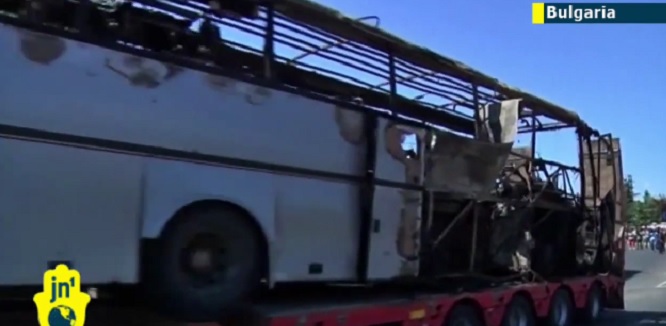The terrorist who in July 2012 blew up an Israeli tourist bus in the Black Sea resort town of Burgas was an Algerian who trained in southern Lebanese camps, according to security sources quoted by the Bulgarian daily Presa and conveyed on Monday by Lebanon’s Daily Star.
“The assailant was born in Algeria, lived in Morocco and was trained in camps in South Lebanon. He also studied at a Beirut university with the other two suspects,” the newspaper said, quoting sources who declined to be named.
The Balkan country has identified the suspects as 32-year-old Meliad Farah, also known as Hussein Hussein, an Australian citizen, and 25-year-old Hassan El Hajj Hassan, a Canadian citizen, both of Lebanese origin.
Reports began to emerge last week that investigators had discovered new information about the July 2012 attack – which killed five Israelis and a Bulgarian, and which Sofia had long ago linked to Hezbollah – when Bulgarian chief prosecutor Sotir Tsatsarov formally transferred investigation of the attack to local authorities in Burgas. Tsatsarov noted at the time that officials had among other things clinched the identity of the bomber, though he declined to provide details.
Presa had previously reported in early March that Bulgarian authorities had recovered DNA from Hassan, one of the other two suspects and the one thought to have managed logistics for the attack. Lebanese outlet Ya Libnan suggested that the evidence – which was recovered from a towel used by Hassan – had been left behind in Hassan’s “haste to leave the hotel as soon as possible.” If so, the slip would constitute one of just a few oversights in an operation that Washington Institute fellow Matthew Levitt has assessed was marked by “improved tradecraft” when compared to previous Hezbollah operations:
Under Nasrallah’s instructions, Badreddine and Hamiyeh “undertook a massive operational reevaluation in January 2010, which led to big changes within the IJO over a period of a little over six months,” in the words of one Israeli official. During this period, IJO operations were put on hold and major personnel changes made. New operatives were recruited from the elite of Hizb Allah’s military wing for intelligence and operational training, while existing IJO operatives were moved into new positions. At the same time, the IJO invested in the development of capabilities and tradecraft that had withered since the 2001 decision to rein in operations.
The increased tempo and sophistication of the terror group’s activities in Europe – another summer 2012 plot, this one in Cyprus, was disrupted – eventually led the European Union (E.U.) to designate what the E.U. described as Hezbollah’s “armed wing” as a terrorist organization, leaving its “political wing” undesignated. Hezbollah officials and U.S. counterterrorism specialists have rejected suggestions that there is any organizational distinction between those two.
[Photo: JewishNewsOne / YouTube]




